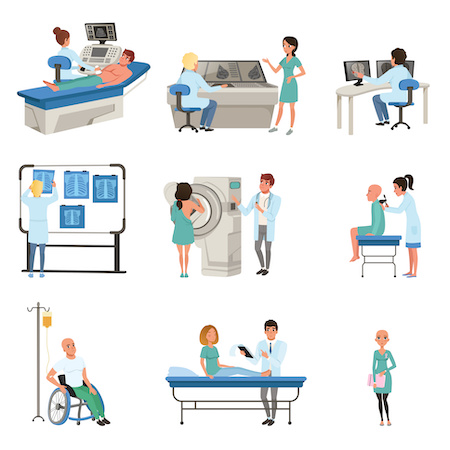The Health and Social Care Secretary Sajid Javid will today (February 4) “declare a war on cancer” and launch a call for evidence to underpin what is being described as “an ambitious 10-Year Cancer Plan for England.”
The vision will be set out in a speech at the Francis Crick Institute. The Health Secretary plans to make England a world leader in cancer care as we learn to live COVID-19 - with renewed attention paid to innovative treatment and early diagnosis to radically improve outcomes for cancer patients.
The Plan will aim to show how the lessons learned from the pandemic will be applied to improving cancer services over the next decade, looking at all stages - from prevention, to diagnosis, treatment and vaccines.
The Health and Social Care Secretary will today set out a set of new and strengthened priorities, which include:
• Increasing the number of people diagnosed at an early stage, where treatment can prove much more effective
• Boosting the cancer workforce
• Tackling disparities and inequalities, including in cancer diagnosis times and ensuring recovery from the pandemic is delivered in a fair way. For instance, the ‘Help Us Help You’ cancer awareness campaign will be directed towards people from more deprived groups and ethnic minorities
• Intensifying research on mRNA vaccines and therapeutics for cancer - this will be achieved through the UK’s global leadership, and supporting industry to develop new cancer treatments by combining expertise in cancer immunotherapy treatment and the vaccine capabilities developed throughout the pandemic
• Intensifying research on new early diagnostic tools to catch cancer at an earlier stage
• Improving prevention of cancer through tackling the big known risk factors such as smoking.
Cally Palmer, National Cancer Director for the NHS, says: “From one stop shops for vital checks and revolutionary treatment options like proton beam therapy - we will continue to go further and faster in our mission to save more lives and ensure England is world leading in cancer care.”
A key part of the strategy will be building on the latest scientific advances and partnering with the country’s technology pioneers. The NHS-Galleri trial is evaluating a new test that looks for distinct markers in blood to identify cancer risk and has already shown how technology can transform the way cancer is detected. The test is being trialled across England, with thousands of people already recruited.
Diagnostic centres
During the COVID-19 pandemic, the government focused on recovering services that had been hit hardest. This included the rollout of nearly 160 Faster Diagnosis Pathways (previously known as Rapid Diagnostic Centres), which aim to speed up diagnosis for cancer without the need for repeat diagnostic checks, and ensure patients with worrying symptoms can be quickly assessed by a GP. By 2024, the programme will be available across England for patients who display symptoms that could indicate cancer but don’t align to specific cancers, such as unexplained weight loss, fatigue or vague abdominal pain.
The government has also invested £2.3 billion to roll out Community Diagnostic Centres, which offer patients rapid access to clinical tests and life-saving checks close to their home. In their first full year of operation, they will deliver up to 2.8 million scans. By 2025, the NHS will be able to carry out 4.5 million additional scans. This will also help reduce waiting times by diverting patients away from hospitals, allowing them to treat urgent patients, while the Community Diagnostic Centres focus on tackling the COVID-19 backlog.
Today’s new call for evidence is seeking input from cancer patients, relatives and NHS staff to gain the deepest understanding of the issue possible and provide the best future for the country’s cancer care. The easiest way to participate is by visiting gov.uk/dhsc.
The call for evidence will run for eight weeks, (closing at 11.45pm on April 1, 2022) after which the government will factor in responses into its new 10-Year Cancer Plan which is expected to be set out in summer.











